|
Dr. Xiaocheng Tang is a senior staff research scientist at DiDi AI Labs and engineering manager in DiDi's Autonomous Driving division. While at DiDi he has been leading the platform's effort on ML-based approaches for core decision making problems such as driver-passenger matching in the ride-hailing marketplace and most recently autonomous motion planning and prediction. More broadly his research interest lies at the intersection of machine learning, reinforcement learning and optimization. He has published 30+ top-conference, patents and journal papers in the field. Additionally, his work on joint optimization of order dispatching and reposition via reinforcement learning won Best Demo Awards at NeurIPS 2018. He and his team received Daniel H. Wagner prize for Excellence in Operations Research practice at INFORMS 2019. His work on AutoML in collaboration with UCLA won Outstanding Paper Awards at ICLR 2021 (code). His work on prediction and planning for autonomous driving won 2nd place, ranked 1st based on minADE, in 2022 Waymo Open Dataset Challenge for Motion Prediction. Xiaocheng received his PhD degrees in Optimization and Machine Learning advised by Prof. Katya Scheinberg (wiki). During his graduate study, he has been actively engaged in analyzing and designing novel optimization theories and algorithms for large-scale problems arising from various applications and in particular those in Artificial Intelligence. His work in fast and scalable training algorithms and convergence theory was presented at NIPS 2013 and was published in the journal of Mathematical Programming which is ranked the No.1 journal in the field of Mathematical Optimization by Google Scholar. Xiaocheng is also an Apache Committer contributing to Apache MADlib — a distributed in-database machine learning library started by Chris Ré from Stanford and Joe Hellerstein from Berkeley among others. He used to work in Numerical Methods group in IBM T.J. Watson Research, Yorktown Heights, NY, and was funded by Yahoo FREP award working on online AD targeting and user personalization in Machine Learning group in Yahoo Labs, Sunnyvale, CA in 2014. He earned his undergrad degree with High Honors from Chu KoChen Honors College and College of Control Science and Engineering in Zhejiang University, Hangzhou, China . Email / GitHub / Google Scholar / LinkedIn |

|
News
|
ResearchI'm interested in reinforcement learning, machine learning, optimization and operation research. Representative papers are highlighted. |
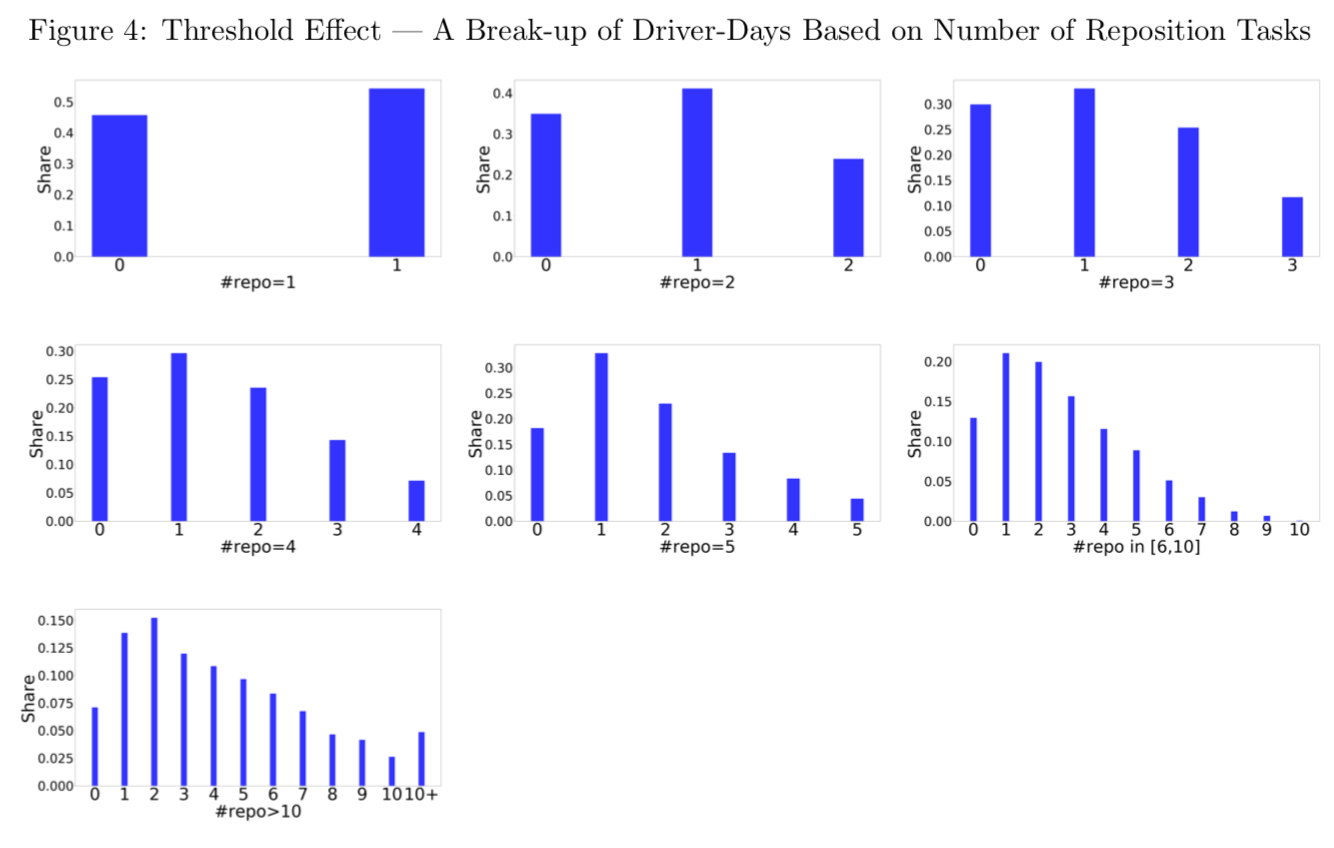
|
Algorithm Aversion: Evidence from Ridesharing DriversMeng Liu (WUSTL), Xiaocheng Tang, Siyuan Xia (SJTU), Shuo Zhang (SJTU), and Yuting Zhu (NUS) minor revision at Management Science, 2022 arxiv / AI algorithms often cannot realize their intended efficiency gains because of their low adoption by human users. We uncover various factors that explain ridesharing drivers’ aversion to an algorithm designed to help them make better location choices. We discuss the managerial implications of these findings. |
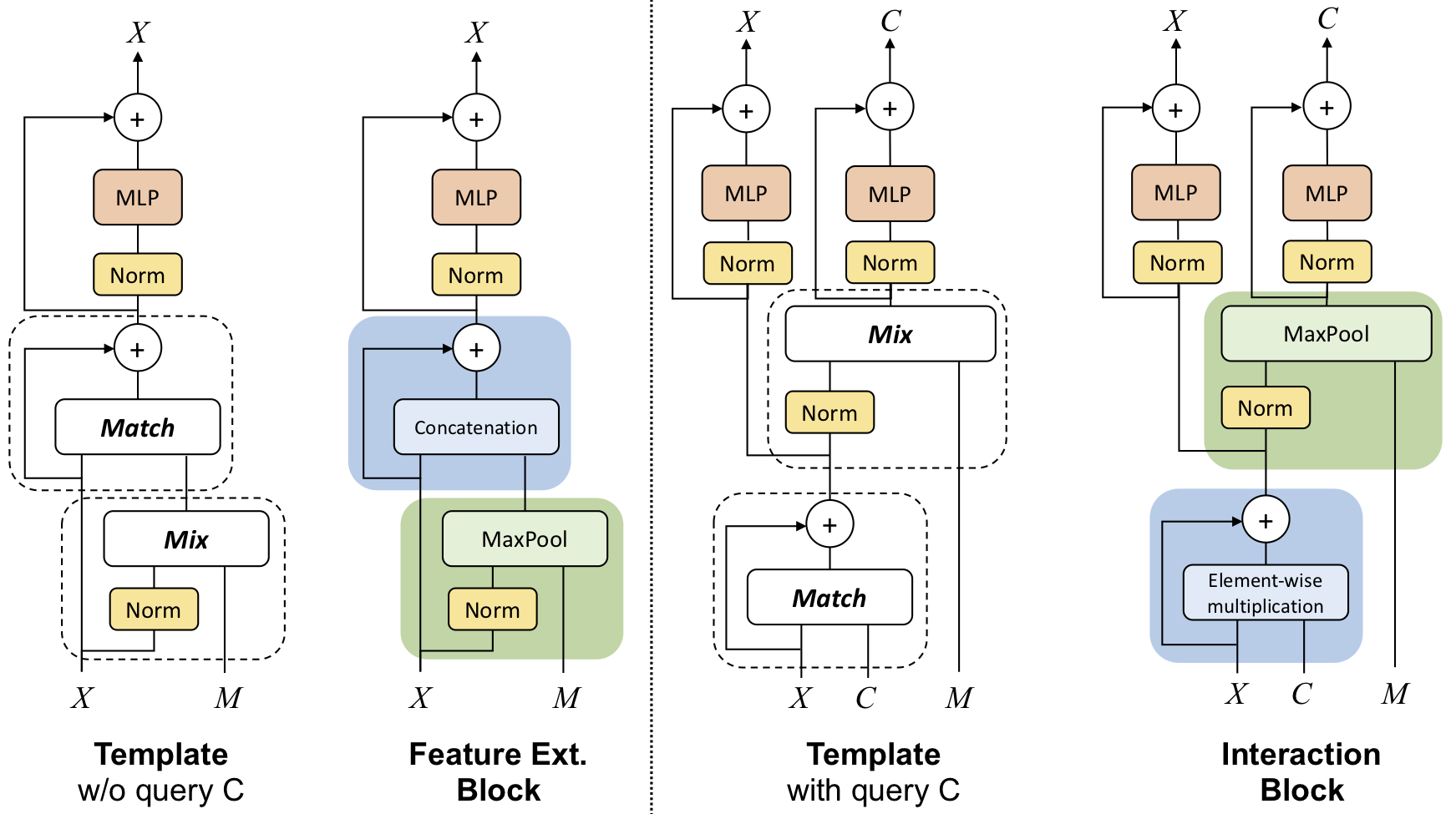
|
Golfer: Trajectory Prediction with Masked Goal Conditioning MnM NetworkXiaocheng Tang, Soheil Sadeghi Eshkevari, Haoyu Chen, Weidan Wu, Wei Qian, Xiaoming Wang Waymo Open Dataset Challenge Winner, CVPR Workshop on Autonomous Driving, 2022 arxiv / Transformers have enabled breakthroughs in NLP and computer vision, and have recently began to show promising performance in trajectory prediction for Autonomous Vehicle (AV). However, efficiently modeling the interactive relationships between the ego agent and other road and dynamic objects remains challenging for the standard attention module. In this work we propose a general Transformer-like architectural module MnM network equipped with novel masked goal conditioning training procedures for AV trajectory prediction. The resulted model, named golfer, achieves state-of-the-art performance, winning the 2nd place in the 2022 Waymo Open Dataset Motion Prediction Challenge and ranked 1st place according to minADE. |

|
Reinforcement Learning in the Wild: Scalable RL Dispatching Algorithm Deployed in Ridehailing MarketplaceSoheil Sadeghi Eshkevari, Xiaocheng Tang, Zhiwei Tony Qin, Jinhan Mei, Cheng Zhang, Qianying Meng, Jia Xu ACM/SIGKDD, 2022 arxiv / The latest work of our sequel (part I and II) on RL-based dispatching algorithm for the ridehailing industry. The algorithm was proposed to particularly account for the human aspect of the problem, e.g., Human-Centered AI, and was deployed in a major international city to interact each day with hundreds of thousand drivers and passenger requests, in which we find that a feedback mechanism based on the contrastive style learning and long-term value bootstrapping can be especially beneficial to improve the marketplace efficiency. |
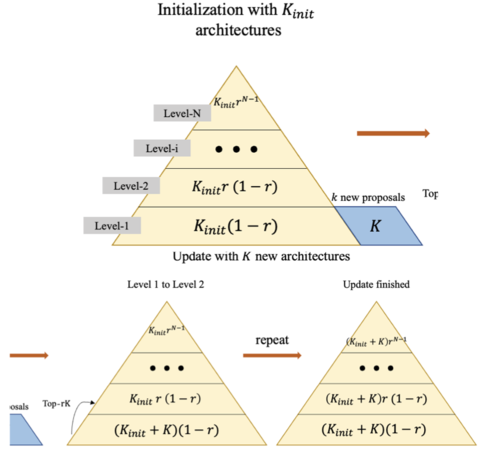
|
RANK-NOSH: Efficient Predictor-Based Architecture Search via Non-Uniform Successive HalvingRuochen Wang, Xiangning Chen, Minhao Cheng, Xiaocheng Tang, Cho-Jui Hsieh ICCV, 2021 arxiv / We propose NOn-uniform Successive Halving (NOSH), a hierarchical scheduling algorithm, combined within a GNN-based learning to rank with pairwise comparisons formulation for predictor-based architecture search. The resulting method - RANK-NOSH, reduces the search budget by ~5x while achieving competitive or even better performance than previous state-of-the-art predictor-based methods on various spaces and datasets. |

|
Measuring Sample Efficiency and Generalization in Reinforcement Learning Benchmarks: NeurIPS 2020 Procgen BenchmarkSharada Mohanty, Jyotish Poonganam, Adrien Gaidon, Andrey Kolobov, Blake Wulfe, Dipam Chakraborty, Gražvydas Šemetulskis, João Schapke, Jonas Kubilius, Jurgis Pašukonis, Linas Klimas, Matthew Hausknecht, Patrick MacAlpine, Quang Nhat Tran, Thomas Tumiel, Xiaocheng Tang, Xinwei Chen, Christopher Hesse, Jacob Hilton, William Hebgen Guss, Sahika Genc, John Schulman, Karl Cobbe Proceedings of the NeurIPS 2020 Competition and Demonstration Track, PMLR 133:361-395, 2021 arxiv / video / The NeurIPS 2020 Procgen Competition by OpenAI was designed as a centralized benchmark with clearly defined tasks for measuring Sample Efficiency and Generalization in Reinforcement Learning. This paper presents the competition setup and the details and analysis of the top solutions identified through this setup in context of 2020 iteration of the competition at NeurIPS. |
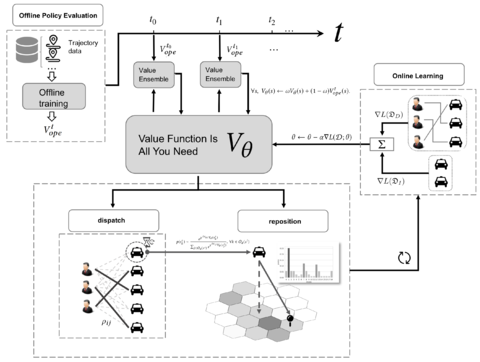
|
Value Function is All You Need: A Unified Learning Framework for Ride Hailing PlatformsXiaocheng Tang, Fan Zhang, Zhiwei Tony Qin, Yansheng Wang, Dingyuan Shi, Bingchen Song, Yongxin Tong, Hongtu Zhu, Jieping Ye Oral presentation, ACM/SIGKDD, 2021 arxiv / video / slides / We propose a unified value-based dynamic learning framework (V1D3) for tackling both order dispatching and vehicle repositioning. At the center of the framework is a globally shared value function that is updated continuously using online experiences generated from real-time platform transactions. V1D3 outperforms the first prize winners of both dispatching and repositioning tracks in the KDD Cup 2020 RL competition, achieving state-of-the-art results on improving both total driver income and user experience related metrics. |

|
Real-world Ride-hailing Vehicle Repositioning using Deep Reinforcement LearningYan Jiao, Xiaocheng Tang, Zhiwei Tony Qin, Shuaiji Li, Fan Zhang, Hongtu Zhu, Jieping Ye Transportation Research Part C: Emerging Technologies, 2021 arxiv / We present a new practical framework based on deep reinforcement learning and decision-time planning for real-world vehicle repositioning on ride-hailing (a type of mobility-on-demand, MoD) platforms. We have also designed and run a real-world experiment program with regular drivers on a major ride-hailing platform. We have observed significantly positive results on key metrics comparing our method with experienced drivers who performed idle-time repositioning based on their own expertise. |
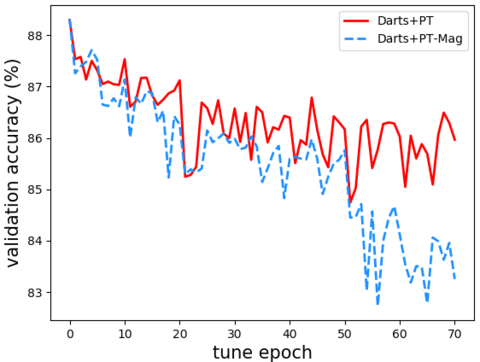
|
Rethinking Architecture Selection in Differentiable NASRuochen Wang, Minhao Cheng, Xiangning Chen, Xiaocheng Tang, Cho-Jui Hsieh Outstanding Paper Awards, 8 out of 860 accepted papers, ICLR, 2021 arxiv / code / We provide empirical and theoretical analysis on the magnitude of architecture parameters and find that several failure modes of Darts can be greatly alleviated with the proposed perturbation-based method, indicating that much of the poor generalization observed in Darts can be attributed to the failure of magnitude-based architecture selection rather than entirely the optimization of its supernet. |
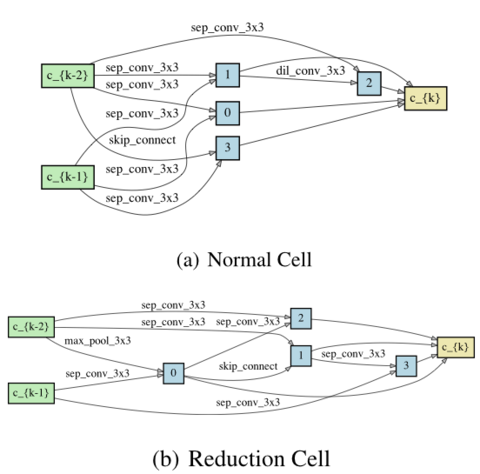
|
DrNAS: Dirichlet Neural Architecture SearchXiangning Chen, Ruochen Wang, Minhao Cheng, Xiaocheng Tang, Cho-Jui Hsieh ICLR, 2021 arxiv / code / This paper proposes a novel differentiable architecture search method by formulating it into a distribution learning problem. We treat the continuously relaxed architecture mixing weight as random variables, modeled by Dirichlet distribution. We obtain a test error of 2.46% for CIFAR-10, 23.7% for ImageNet under the mobile setting. |
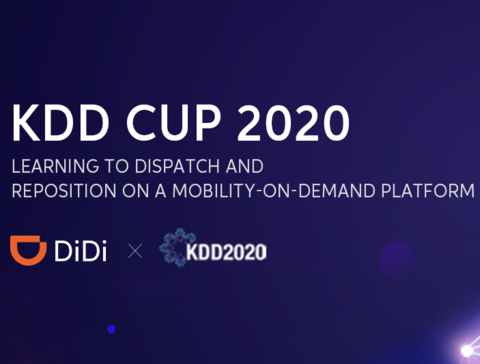
|
KDDCUP 2020: Learning to Dispatch and Reposition on a Mobility-on-Demand PlatformZhiwei Qin, Xiaocheng Tang, Lulu Zhang, Yanhui Ma, Jianhua Zhang, Fan Zhang, Cheng Zhang ACM/SIGKDD, 2020 video / code / The challenge that the participants are to solve involves a combination of order dispatching (order matching) and vehicle repositioning (fleet management) on an MoD platform. The teams are to develop algorithms for either or both of these tasks. The algorithms are evaluated in a simulation environment that simulates the dynamics of an MoD platform. |

|
Wagner Prize Winner: Ride-hailing Order Dispatching on DiDi via Reinforcement LearningZhiwei Qin, Xiaocheng Tang, Yan Jiao, Fan Zhang, Zhe Xu, Hongtu Zhu, Jieping Ye INFORMS/Daniel H. Wagner prize for Excellence in Operations Research, 2019 arxiv / video / slides / The evolution of our approach to the optimization problem of order dispatching from a myopic combinatorial optimization approach to one that encompasses a semi-MDP model and deep reinforcement learning for long-term optimization. |
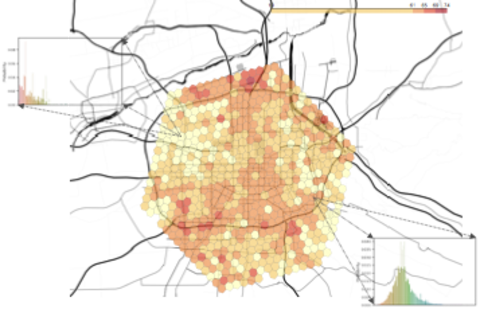
|
A Deep Value-network Based Approach for Multi-Driver Order DispatchingXiaocheng Tang, Zhiwei Tony Qin, Fan Zhang, Zhaodong Wang, Zhe Xu, Yintai Ma, Hongtu Zhu, Jieping Ye Oral presentation, acceptance rate 6%, ACM/SIGKDD, 2019 arxiv / video / slides / We propose a deep reinforcement learning based solution for order dispatching and we conduct large scale online A/B tests on DiDi’s ride-dispatching platform to show that the proposed method achieves significant improvement on both total driver income and user experience related metrics. |
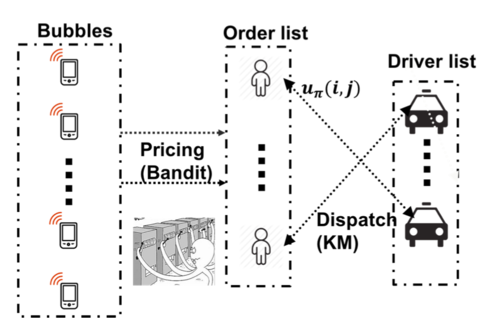
|
InBEDE: Integrating Contextual Bandit with TD Learning for Joint Pricing and Dispatch of Ride-Hailing PlatformsHaipeng Chen, Yan Jiao, Zhiwei Tony Qin,Xiaocheng Tang, Hao Li, Bo An, Hongtu Zhu, Jieping Ye IEEE/International Conference on Data Mining (ICDM), 2019 arxiv / Classic approaches to improve marketplace efficiency usually optimize pricing or dispatch separately. We show that these two processes are in fact intrinsically interrelated, and motivated by this observation, we make an attempt to simultaneously optimize pricing and dispatch strategies. |
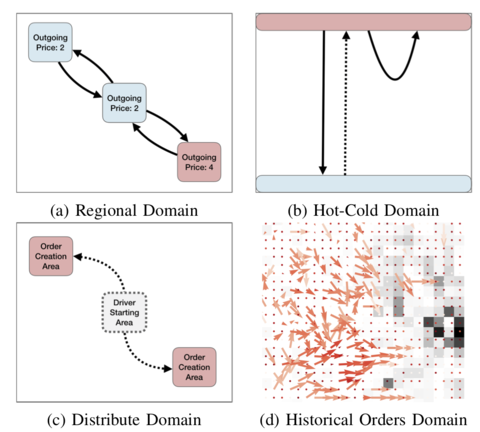
|
Deep Reinforcement Learning for Dynamic Multi-Driver Dispatching and Repositioning ProblemJohn Holler, Risto Vuorio, Zhiwei Qin, Xiaocheng Tang, Yan Jiao, Tiancheng Jin, Satinder Singh, Chenxi Wang, and Jieping Ye IEEE/International Conference on Data Mining (ICDM), 2019 arxiv / We present a deep reinforcement learning approach for tackling the full fleet management and dispatching problems. In addition to treating the drivers as individual agents, we consider the problem from a system-centric perspective, where a central fleet management agent is responsible for decision-making for all drivers. |
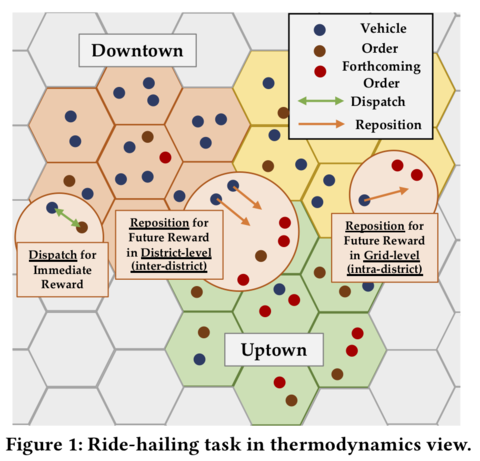
|
CoRide: Joint Order Dispatching and Fleet Management for Multi-Scale Ride-Hailing PlatformsJiarui Jin, Ming Zhou, Weinan Zhang, Minne Li, Zilong Guo, Zhiwei Qin, Yan Jiao, Xiaocheng Tang, Chenxi Wang, Jun Wang, Guobin Wu, Jieping Ye ACM/International Conference on Information and Knowledge Management (CIKM), 2019 arxiv / We model ride-hailing as a large-scale parallel ranking problem and study the joint decision-making task of order dispatching and fleet management. We leverage the geographical hierarchy of the region grids to perform hierarchical reinforcement learning. And to deal with the heterogeneous and variant action space for joint order dispatching and fleet management, we design the action as the ranking weight vector to rank and select the specific order or the fleet management destination in a unified formulation. |
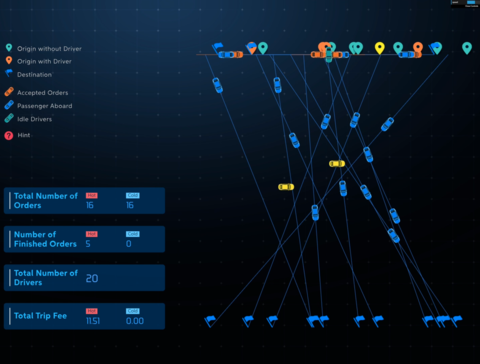
|
NeurIPS Best Demo Awards: Deep RL for Online Order Dispatching and Driver RepositioningXiaocheng Tang, Zhiwei Qin, Yan Jiao, Jieping Ye, Chenxi Wang NeurIPS, 2018 video / An end-to-end attention-based learning system to demonstrate the joint training of dispatching and repositioning that is capable of adaptively optimizing the distribution alignment between orders and drivers in a manner that maximizes the total income for the drivers. |
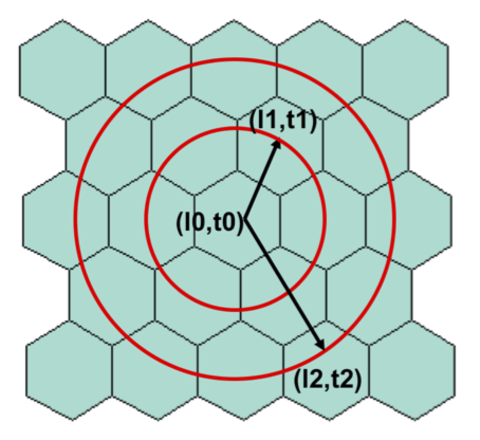
|
Deep Reinforcement Learning with Knowledge Transfer for Online Rides Order DispatchingZhaodong Wang*, Zhiwei Qin*, Xiaocheng Tang*, Jieping Ye, Hongtu Zhu IEEE/International Conference on Data Mining (ICDM), 2018 arxiv / Ride dispatching is a central operation task on a ride-sharing platform to continuously match drivers to trip-requesting passengers. We propose learning solutions based on deep Q-networks with action search to optimize the dispatching policy for drivers on ride-sharing platforms. We train and evaluate dispatching agents for this challenging decision task using real-world spatio-temporal trip data from the DiDi ride-sharing platform. |
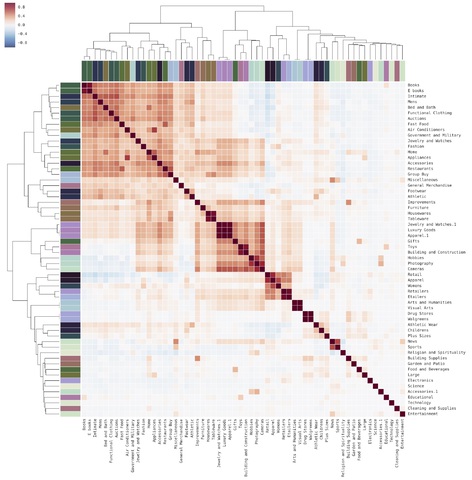
|
Practical inexact proximal quasi-Newton method with global complexity analysisKatya Scheinberg, Xiaocheng Tang Mathematical Programming A, 2016 arxiv / video / code / slides / Recently several methods were proposed for sparse optimization which make careful use of second-order information to improve local convergence rates. We propose a general framework, which includes slightly modified versions of existing algorithms and also a new algorithm, which uses limited memory BFGS Hessian approximations, and provide a novel global convergence rate analysis, which covers methods that solve subproblems via coordinate descent. |

|
A Fast Decomposition Approach for Traffic ControlXiaocheng Tang,Sebastien Blandin, Laura Wynter International Federation of Automatic Control, 2014 arxiv / We present a fast decomposition method for network optimization problems, with application to real-time traffic control. Our approach is based on a nonlinear programming formulation of the network control problem and consists of an alternating directions method using forward numerical simulation inplace of one of the optimization subproblems. The method is scalable to realistic city-size road networks for real-time applications, and is shown to perform well on synthetic and real traffic networks. |
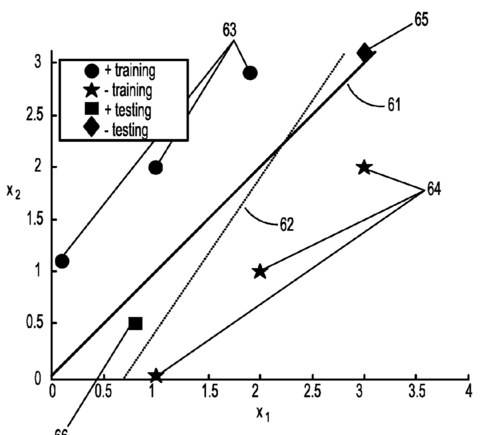
|
HIPAD-A Hybrid Interior-Point Alternating Direction algorithm for knowledge-based SVM and feature selectionZhiwei Qin, Xiaocheng Tang, Ioannis Akrotirianakis, Amit Chakraborty International Conference on Learning and Intelligent Optimization, 2014 arxiv / We propose a new hybrid optimization algorithm that solves the elastic-net support vector machine (SVM) through an alternating direction method of multipliers in the first phase, followed by an interior-point method for the classical SVM in the second phase. Both SVM formulations are adapted to knowledge incorporation. Our proposed algorithm addresses the challenges of automatic feature selection, high optimization accuracy, and algorithmic flexibility for taking advantage of prior knowledge. |
|
|